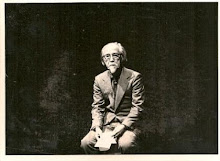
Unbridled optimism is a trait that has long been ridiculed by the public. It is a trait that is usually used as comic fodder in films; something to laugh at and oftentimes looked upon as the refuge of the simpleton. Of course cynicism itself is no better; it has become, for many, a defense mechanism to ease the pain of daily living. Ed Wood is a celebration of a man whose ideas exceeded his talents. Edward D. Wood, Jr. would go down in movie history as the world's worst director of all time, and his film Plan 9 from Outer Space the worst movie ever made. And yet what has contributed to his work getting more attention now than when they were first released is the fact that although the pictures he made were of varying quality you could tell that an enthusiast was behind the camera putting together the various pieces that make up a film, even if all those pieces didn't come together so neatly.
Tim Burton took directorial reins on Ed Wood for several reasons. The first being that he was already a fan of the director's work; drawn in by the fact that no matter what project Wood was working on he treated the material as if it were Citizen Kane. As a result of Burton's admiration for Wood's work the film has an obvious bias; portraying Ed Wood not as a delusional hack but rather as a sincere artist. The second reason Burton had for directing was the relationship Wood had with Bela Lugosi which mirrored the relationship Burton had with Vincent Price. And finally after reading the script, penned by Scott Alexander and Larry Karaszewski, Burton saw the film as an opportunity to make a character-driven film as opposed to one distinguished by visual flourishes.
As a character-driven film it is on the actor's shoulders to breath life into the story and Johnny Depp delivers in every scene he's in. Depp studied Andy Hardy, Mickey Rooney, Ronald Reagen, and Casey Kasem to bring the character of Ed Wood to life. He carefully balances Wood's trademark blind optimism with his sexual quirks and manages to always keep the audience on his side. As we watch Depp play the character of Ed Wood we never slip and laugh at him. It is to Johnny Depp's credit that what could have turned into a very unfunny caricature of the director never does. Wood's sexual proclivity for dressing in women's clothing is treated not as a punch-line to a cliche joke, but just a matter-of-fact detail about Edward Wood's life.


The meat of the film deals with Wood's relationship with Bela Lugosi, played by Martin Landau. These two men each believe that the other can help their careers, but in actuality it is their friendship and not their business partnership which has the most value for both men. Landau plays Bela as a man who aches for another chance at stardom and you believe that he may just get that opportunity. Bela, even in his 60's, never lost the ability to frighten people with a stare or subtle hand gesture. As Lugosi tells Wood during their first meeting, "The pure horror, it both repels, and attracts them, because in their collective unconsciousness, they have the agony of childbirth. The blood. The blood is horror." With that statement Lugosi gets to the heart of not just why the horror genre has always been popular, but also the fact that fear is a drug that the human race has been addicted to since we began to walk upright.

Other important people in Ed's story are the various women in his life. The two most important being Dolores Fuller, his girlfriend at the start of the film, and Kathy O'Hara, the woman who would become his wife by the end of the movie. Although Sarah Jessica Parker's portrayal of Dolores has been criticized as shrill and unpleasant she is quite supportive of Ed and her demands aren't at all unreasonable. In fact her only mistake in the movie is being the voice of reason in a story populated by people completely entranced by the magic of film. Kathy on the other hand is wholly accepting of Ed and Patricia Arquette plays Kathy as the embodiment of Ed's optimism. Whereas many people in Ed's group might question his choices Kathy not only goes along with Ed, but she goes out of here way to feed his enthusiasm.


Edward D. Wood, Jr. was somebody who wasn't that concerned about what movie he was making, but rather just having the opportunity to make a film was what thrilled him. When he was in the process of directing there would be two things that he was never without, his megaphone and a boyish grin on his face. And that was basically who Ed Wood is in Tim Burton's film; a boy who still believed that all you needed to make a movie was a good idea and a crew of people who shared your excitement for the project.








